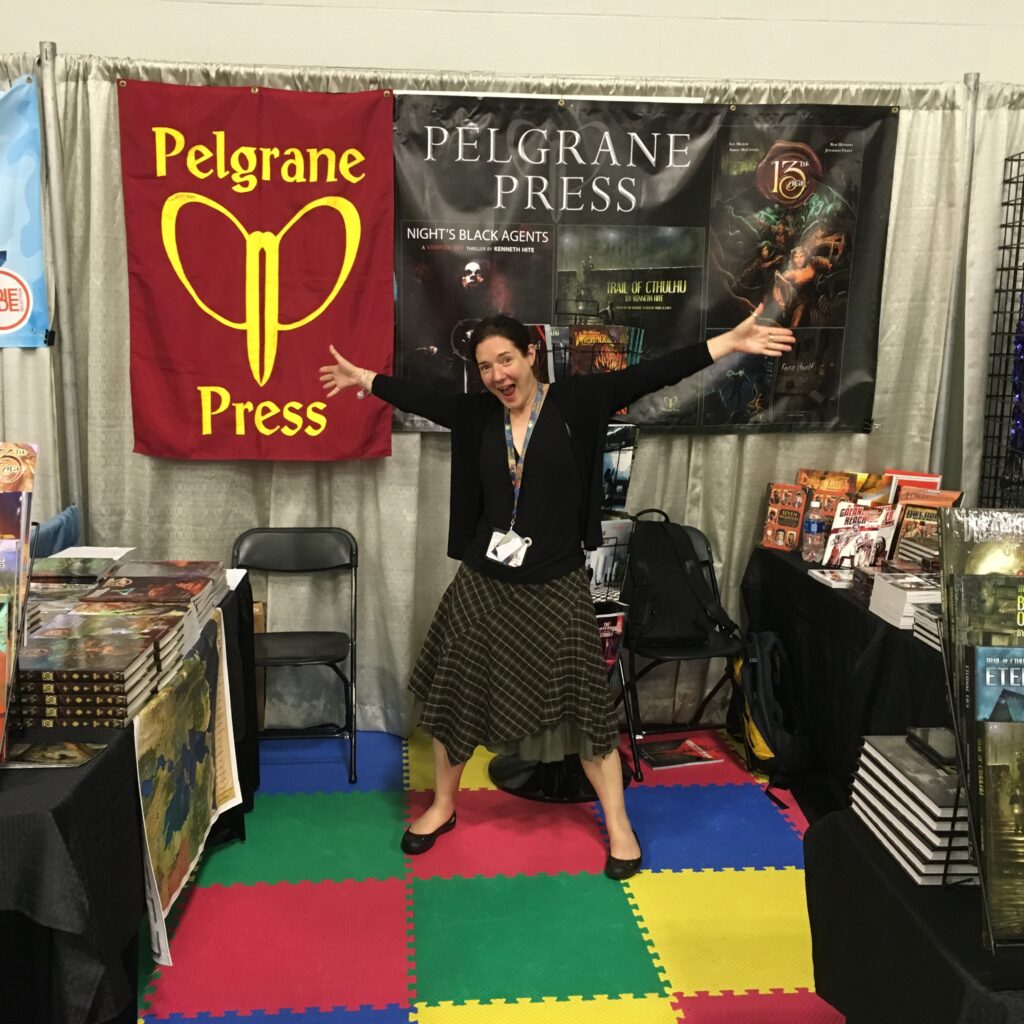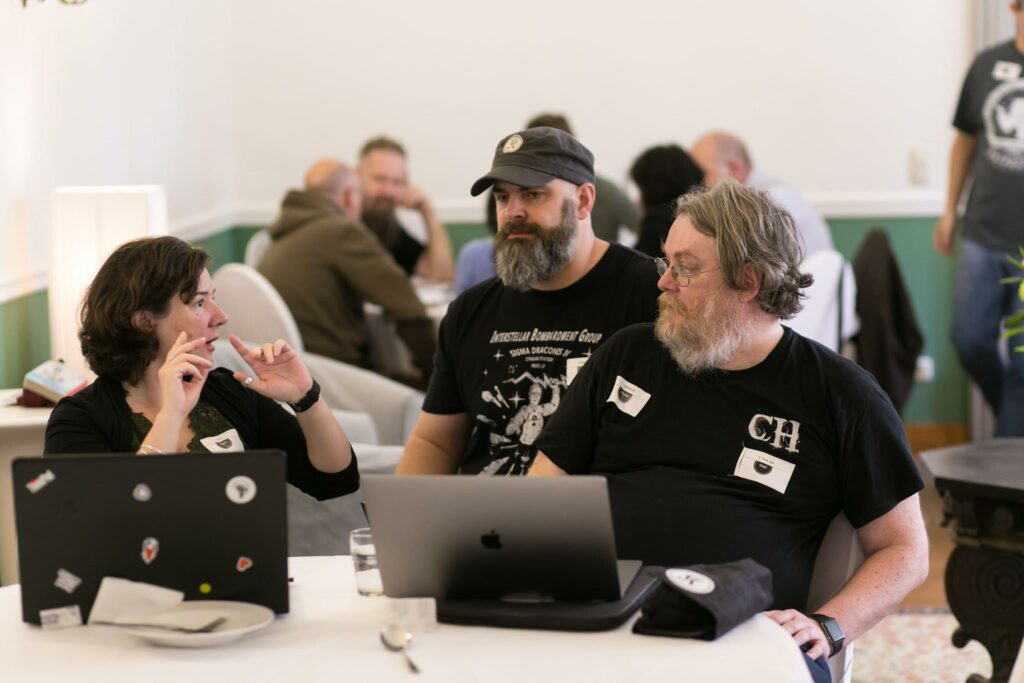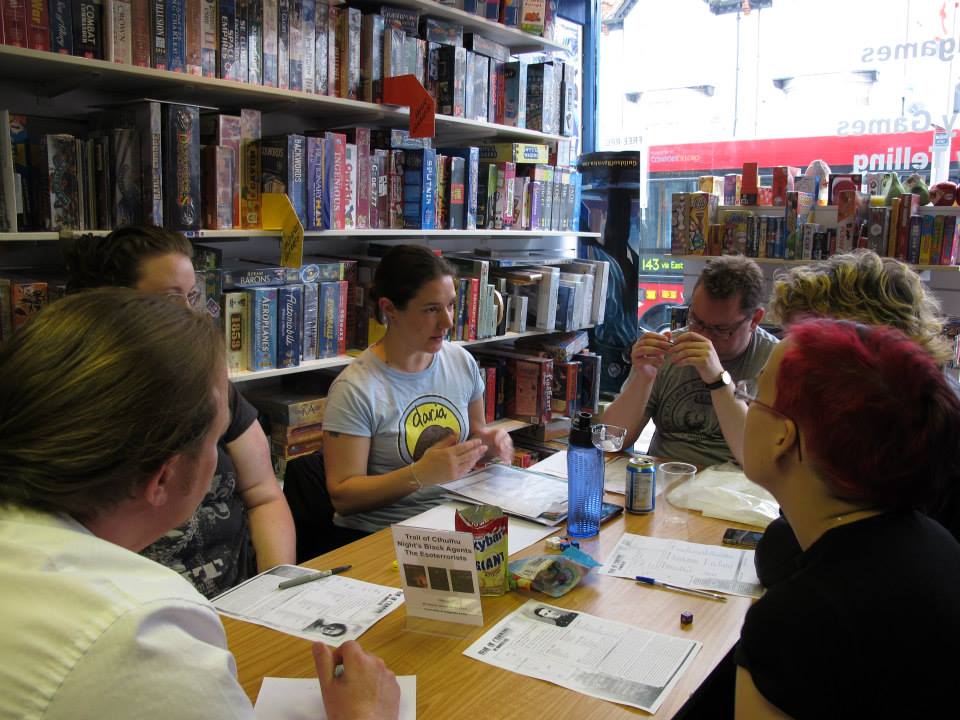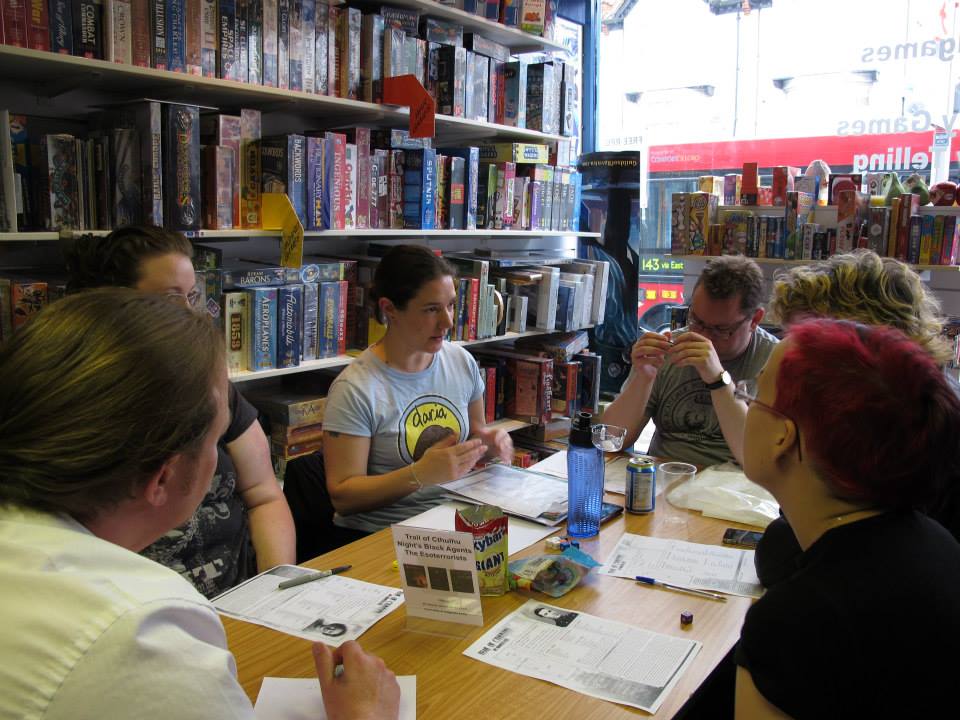Irlannin Corkista kotoisin oleva Cat Tobin on pitkän linjan pelisuunnittelija, joka tunnetaan parhaiten Pelgrane Press -pelikustantamosta, jonka hän omistaa Simon Rodgersin kanssa. Tobin on tehnyt pitkän linjan työtä roolipelien parisssa, ja hän on ollut julkaisemassa yli sataa roolipeliä. Tobinin työ Pelgrane Pressissä on tuonut kustantamolle lukuisia palkintoja, kuten Amerikan Gen Conissa yleisön suosion perusteella jaettavat ENnie-palkinnot.
Tobin on myös suuri tasa-arvon ja feminismin puolestapuhuja alalla, ja tekee paljon työtä pelialalla Yhdistyneessä Kuningaskunnassa työtä tekevien naisten verkostoitumisen edistämiseksi. Omien sanojensa mukaan hän on suunnittelija, joka on kiinnostunut immersiosta ja oikeita tuntemuksia herättävistä peleistä. Hän rakastaa kahvia ja vihaa aikaisia aamuherätyksiä. Kysyimme kunniavieraalta muutaman kysymyksen pelisuunnittelusta ja pelialalla työskentelystä.

Cat at Origins 2017
Did you always want to work with games, or did a hobby turn into a business? What did your career path look like?
OMG YES. I did unpaid work in RPGs for fifteen years – being involved with and running RPG conventions in Ireland & the UK, doing accounting for small RPG companies, writing articles and convention adventures – before getting the paid job at Pelgrane. I was running the London convention Dragonmeet when I met Simon Rogers (now my business partner), and he passed me on the job description for a vacancy at Pelgrane a few months later. I worked my butt off to make myself indispensable, and a few years later, Simon offered me 50% of the company.
You have graduated with a Bachelor of Arts from English and Philosophy, do you feel that these studies have helped you in your career?
I think having studied English literature definitely helps with the editing and writing development I do in my job, but really, getting involved in student societies in college like the Wargaming and Roleplaying Society (WARPS) and their convention, WarpCon, was the biggest help to me in my career. My work with WARPS not only revealed what I wanted to do, but also in taught me the necessary planning and organisation skills needed to run a publishing company.
You are one of the co-owners of Pelgrane Press, could you tell us a little about your role in the company? What projects and games have been your favourite ones, and can you tell us why they have been so dear to you?
As the Managing Director of a small company, my role spreads across all areas. I work with Simon on the large-scale strategy and direction of the company, and deciding which projects get the go-ahead. I work with our authors to deliver and develop their manuscripts; with artists and graphic designers on the art and layout of each book; and with printers and our distributer to get our books out to game stores. I also plan and run all our marketing campaigns and Kickstarters, design and produce all our merchandise, work with our licensees on foreign translations and other works using Pelgrane IP; and co-ordinate our booth presence and events at conventions.
I’m very lucky in that I really like Pelgrane products, so I have a lot of favourites! If I absolutely had to pick one, I think the project that’s dearest to my heart is Seven Wonders, an anthology of short games by emerging designers. That was my idea, I managed it all the way through, and I’m tremendously proud of the result. In terms of biggest impact on me, that would have to be the Dracula Dossier, which…well, that’s maybe a story for another time!!
Pelgrane Press has run many successful Kickstarter campaigns, such as raising £167,341 for their RPG game Yellow King. How do you see the role of Kickstarter and similar platforms influencing the future of RPG?
That’s a great question. Kickstarter’s demonstrated that there’s actually a considerable money out there for RPGs, which I don’t think the industry had realised previously. It’s really disrupted the traditional RPG business model (distributors –> game stores –> customers), too – RPG companies can take chances with more innovative, ”out there” designs, now that they don’t have to convince game stores to carry them to succeed. I think Kickstarter’s direct to consumer model will continue to shape how RPG companies publish going forward – we’re already seeing that with spinoff platforms like Patreon and Ko-fi – and the add-ons component will continue to grow the RPG merchandise market segment.

Cat and Fabian and Andrew
Your company is known for your roleplaying system GUMSHOE, which focuses on interpreting clues and solving mysteries. What makes for a great mystery game and how does GUMSHOE improve on traditional systems used in mystery RPGs?
I think a great mystery game flows well and is suspenseful. That means that it’s well paced – there are contributing clues scattered throughout, rather than front-ended, or a big info-dump at the end – and also, that it moves, via peaks and troughs, constantly forward to a resolution – there are no sticking-points or moments where the players feel stumped.
The GUMSHOE system is designed to ensure the players never miss out on a clue through a bad roll, and they’re never stuck. It does this by what we call ”Investigative abilities”, which allow players to always get clues related to that ability without rolling, and support the GM to narratively nudge the action forward by providing clues via those abilities (e.g., ”As a long-time student of Architecture, your character spots a secret door.”)
I find the scene-based structure of GUMSHOE adventures very helpful as a pacing guide – using a Scene Flow Diagram, the GM can tell how much progress the players have made towards solving the mystery, which helps them to maintain the suspense.
You wrote and designed the game First Joyful Mystery, which was part of the #fFeminism game anthology. The game explores themes such as abortion and women’s rights. Was it difficult to design a game with such heavy themes?
Honestly – yes, it was. My design aesthetic tends very much towards the comedic and light-hearted, so it was a big departure in terms of what I’d written before. The biggest issue in Irish feminism at the time was around abortion, so I felt I’d be doing the anthology a disservice by not writing about that.
What kind of feedback have you received from making the First Joyful Mystery?
Ignoring the few eye-rolls, it’s been largely positive. Since I wrote it, we’ve repealed the Eighth Amendment to our Constitution here in Ireland, effectively legalising abortion, so it hasn’t made as many waves as I was concerned about. And a number of people in the US have run it to raise awareness of the issues around abortion, so I think it’s been a useful tool for people, which I’m delighted about.

Cat running Trail
In addition to designing a game about women’s rights, you have also been a vocal advocate for women in the game industry and have spoken about the gender-based harassment and discrimination. Do you feel that things have changed since the beginning of your career?
Definitely, yes. I believe identifying issues is the first step towards resolving them, and I think we as an industry have a much greater public awareness now of the difficulties faced by women in gaming. I’ve seen that with that knowledge comes pressure on those who consider themselves good people to become better allies to women and other underrepresented groups, and so I think we’ve made our spaces considerably safer than they were when I started gaming.
What are the key issues we should still be working on, in order to make the industry more inclusive?
We need to create a supportive and welcoming environment for everyone, irrespective of gender, sexuality, race, religion or ability. That means we all have a responsibility to educate ourselves about systemic and institutional racism and sexism, as well as other forms of oppression. We need to listen when people share their lived experiences. We then need to incorporate that learning and listening into how we design our RPGs, and how we run our stores and conventions, to create the safest space we can. We also need to be clear that racist, sexist, trans- or homophobic games, comments, or ”jokes” are not welcome in our space, and that without a behaviour change, neither will the originators of those.
Additionally, I think bridging the gap between the industry areas that have more diverse writers (such as the itch.io community), and the industry areas looking to hire more diverse writers (such as the larger RPG publishers) is key, and to do that we need to put money and time into helping diverse writers learn the skills larger RPG publishers are hiring for, such as extended rules and mechanics design, developing expansive worlds, structuring writing across book-length projects.
We live during a weird time. How has COVID-19 impacted your work? Do you have any insights as to how it may impact the game industry in general?
Since moving home to Ireland six years ago, I’ve been working remotely, and so my working conditions, and that of the team, continued as usual. I have noticed a significant increase in mental health issues among my extended colleagues and freelancers. Many of them are struggling with the impact of ill-health, bereavement, stress, and income loss during the pandemic. It’s been a difficult time for everyone, and I’m concerned about the long-term impact of COVID-19 on game stores, many of which have closed down as a result of extended lockdowns.
Do you have any tips for people who dream about working in the game industry?
I think it’s really important to understand why you want to work in games – it’s a very competitive industry, and very few people are earning a full-time living in it, so you need to be able to support yourself independently while you develop your career. You also need to know what specifically you want to do within the industry.
If you want to be a writer or game designer, or an artist, I’d recommend setting up a blog and social media accounts, and posting on them regularly; practising your art or your writing; sharing your work on social media; looking at Community Content programs on DriveThruRPG and working within the companies’ guidelines to design your own content; taking part in game jams on itch.io, and relevant hashtags on Twitter; playtesting other people’s games, to develop your design taste and critical skills; running games at conventions, to build your GM skills and understanding of how adventures work; and building connections with other writers and artists online.
If you want to work on the publishing side, I’d recommend learning as much as possible about the business and the process of publishing; building connections with emerging game designers and writers and working with them to publish their games; following industry professionals on social media, and taking part in relevant conversations with them; and keeping an eye on industry job postings, or if you’re feeling brave, just setting up your own company and sourcing writers and artists!
The most important thing is just to dive on in there and have a go 🙂
